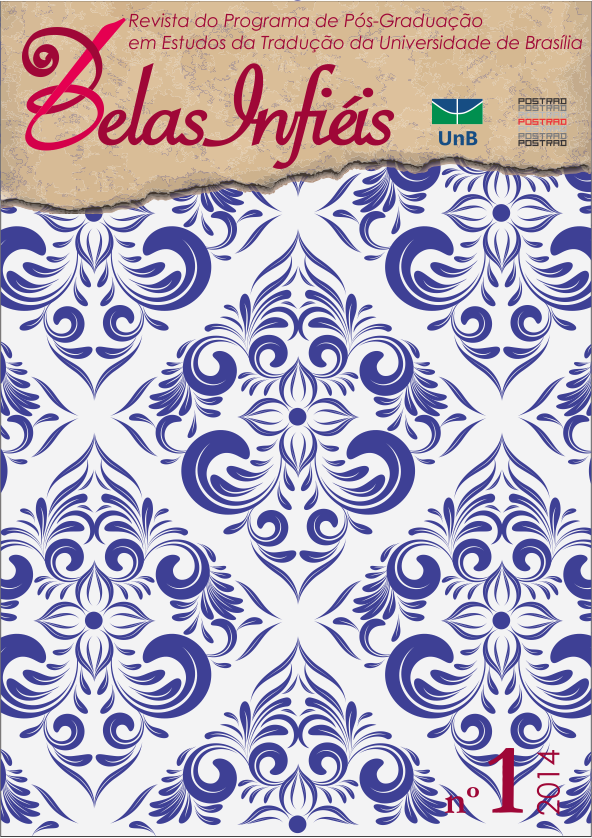COMUNICAÇÃO NA ALDEIA GLOBAL:
SOBRE LINGUAGEM, TRADUÇÃO E IDENTIDADE CULTURAL
DOI:
https://doi.org/10.26512/belasinfieis.v3.n1.2014.11262Resumen
Este trabalho tem como objetivo mostrar o efeito dos desenvolvimentos recentes (em particular a globalização e os avanços tecnológicos) em nossa produção e percepção de língua, e na tradução e no perfil de trabalho do tradutor. As duas forças opostas do globalismo e tribalismo são apresentadas e contrapostas ao conceito sociológico de identidade cultural. A posição do inglês como língua franca mundial (e em estudos pós-coloniais) será discutida junto com a atual constelação de línguas na Europa atualmente e o fenômeno de hibridismo resultante. Deve-se chegar a conclusões com relação à s atividades variadas de tradução na atualidade e sobre o perfil de trabalho do tradutor em constante mudança, o que será feito a partir da comparação entre quatro trabalhos autênticos de tradução: de uma organização internacional, de uma firma de eletrodomésticos com filiais por toda a Europa, de um panfleto publicitário de uma linha aérea e de um romance best-seller recente. Tendo como base o que foi dito acima, o perfil de trabalho do tradutor moderno é esboçado, mostrando ele ou ela como um perito em cultura internacional em um mundo internacionalizado que é ao mesmo tempo caracterizado por uma abundância de comunidades de culturas individuais.
Descargas
Descargas
Publicado
Cómo citar
Número
Sección
Licencia
Copyright Statement
Given the public access to this journal, the texts are free to use but requires the recognition of the original authorship and initial publication in this journal to be properly stated.
The journal allows the use of works published for non-commercial purposes, including the right to submit the work to publicly accessible databases. Published contributions are the sole and exclusive responsibility of the author(s).
- When submitting papers to be evaluated by the Belas Infiéis journal, the author(s):
- Declare that the contents of the contributions are original and of their original creation, being entirely responsible for their content if there is an objection by third parties.
- Claim to be aware that they should not commit academic plagiarism.
- Declare that the manuscript has not been published, completely or partially, in Portuguese or another language. If it is a translation it should be submitted to the Translated Articles section.
- Declare that the manuscript is not being evaluated by other journals.
- Declare that the manuscript was not submitted to another journal simultaneously.
- Commit(s) to inform the journal of any kind of error or inaccuracy in their contribution (published, in evaluation or in editing) and to collaborate with the editors to make due corrections of the article (when in evaluation or editing) or erratum/retraction (after publication).
- Declare that there is no conflict of interest regarding the published work.
- Authorize its release if it is accepted for publication without any kind of monetary compensation.
- Agree to assign non-exclusive rights to publication to the magazine, remaining free to make their contribution available in other media as long as the publication of the first version in Belas Infiéis magazine is mentioned. They also authorize Belas Infiéis to assign their texts for reproduction in content indexers, virtual libraries and similar platforms.
- Maintain copyright and grant the journal the right of first publication, the work being licensed under theCreative Commons Attribution License.
- Is/Are allowed and encouraged to publish and distribute their work online after the editorial process, which may increase the impact and citation of the published work.
- Authorize the editorial team to make textual adjustments and to adapt the article to the publication rules, when necessary.



















